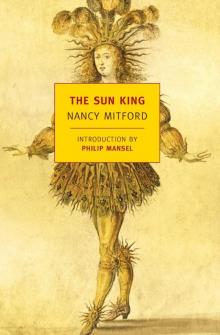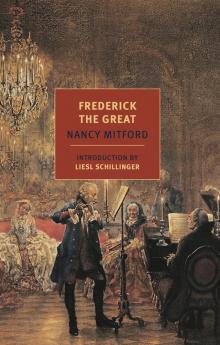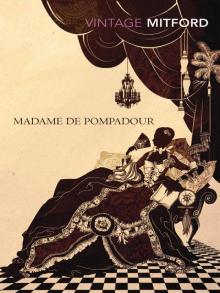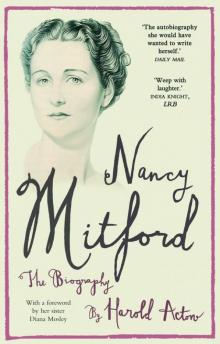- Home
- Nancy Mitford
The Blessing Page 5
The Blessing Read online
Page 5
He came out at once, shut the door, put his-arms round her, and said, ‘You were quite right to come. It was very dull in there, and now we’ll go to your room.’
‘Oh no,’ said Grace. ‘It wasn’t for that.’
‘How d’you mean? it wasn’t for that. What is “that”, anyway?’ he said, laughing.
‘Oh don’t laugh at me, it was terrible going in there. I was so terribly frightened, but I had to. It’s about Nanny.’
‘Yes, yes, I know. We must have a long talk about Nanny, but not now. First we go upstairs – what must be must be, and quickly too.’
‘No, first we go to the kitchen and ask for a floury potato for Nanny, who is waxy, in a bait, I mean, because they’ve had no luncheon.’
Grace, by now, was really rather hysterical.
‘Had no luncheon!’ cried Charles-Edouard, ‘this is too much. I must find my Grandmother.’
‘Oh they had it all right, they just couldn’t eat it.’
‘What d’you mean, Grace? I’m sure they had the same as we did. You said yourself it was delicious.’
‘Yes, of course it was, and I’m furious with Nanny for complaining, but the fact is Nannies never can bear new food you know, it’s my own fault, I ought to have remembered that. Now dear, dearest Charles-Edouard, do come to the kitchen and help me to find something she can eat.’
‘Very well. And tomorrow we send her back to England.’
There. Grace’s heart sank.
‘But who would look after poor little Sigi?’
‘M. le Curé must find him a tutor. This child is quite unlettered, I had a long talk with him in the train. He knows nothing, and can’t even read.’
‘But of course not, poor little boy. He isn’t seven yet!’
‘When I was five,’ said Charles-Edouard, ‘I had to read all Dumas, père.’
‘I’ve noticed everybody thinks they themselves could read when they were five.’
‘Ask M. le Curé.’
‘Anyway you must have been too sweet for words,’ said Grace. ‘I only wish I’d known you then.’
‘I was exceedingly brilliant. Now here is the kitchen, and here, by great good luck, is M. André, the head chef. Will you please explain exactly what it is that you do want?’
While some of the household slept (though sharp attacks of insomnia characterized that afternoon) and Madame de Valhubert prayed, Madame Rocher des Innouïs and M. de la Bourlie took themselves off to a little garden, deeply shaded by an ilex tree, to have a nice chat about Grace. One summer long ago they had conducted a violent love affair under the very noses of Madame de Valhubert, Madame de la Bourlie, M. Rocher, and Prince Zjebrowski, the lover of Madame Rocher. It had really been a tour de force of its kind; they had succeeded in hoodwinking all the others, none of whom had ever had the slightest suspicion of it. After that they had remained on cosy, rather conspiratorial terms.
‘We must begin by saying that she is beautiful – more beautiful, perhaps, than Priscilla.’ Madame Rocher spread out the ten yards of her Dior skirt and settled herself comfortably with cushions. ‘But not, as anyone can see, a society woman. Of good family, yes perhaps, but perfectly green in worldly matters. She told me, at luncheon, that she has hardly been out in society since the war, but spent all those years looking after goats. Of course the English are very eccentric, you don’t know that, Sosthène, you have never crossed the Channel, but you can take it from me that they are all half mad, a country of enormous, fair, mad atheists. Why did she look after goats? We shall never know. But looking after goats can hardly be considered as a good preparation for life with Charles-Edouard, and I am bound to say I feel uneasy for her. They are not married religiously, by the way.’
‘Oh! How do you know?’
‘I asked her.’
‘What an extraordinary question to ask.’
‘After all, I am Charles-Edouard’s aunt.’
‘I meant what an extraordinary idea. It would never have occurred to me that they might not be.’
‘It occurred to me. I know England, Sosthène. We went every year for the Horse Show, don’t forget.’
‘Shall you tell Françoise?’
‘Of course not, on no account, and nor must you. It would upset her dreadfully.’
‘Speaking frankly then, nothing matters very much?’
‘I don’t agree at all. It’s true that they can easily be divorced, and that Charles-Edouard will be able to marry again without waiting for an annulment, but before that happens he will have made her totally miserable. Charles-Edouard is a good, warmhearted boy, he won’t be able to help making her miserable, but he will suffer too. Oh dear, what could have induced him to marry an Englishwoman – these English with their terrible jealousy – it will be the story of Priscilla all over again, you’ll see.’
‘But the English husbands then, how do they manage?’
‘English husbands? They go to their clubs, their boat race, their Royal Academy – they don’t care for making love a bit. So they are always perfectly faithful to their wives.’
‘What about the Gaiety Girls?’
‘I don’t think they exist any more. You are behind the times, my poor Sosthène, it is the gaiety boys now, if anything. But they have no temperament. Now Charles-Edouard cannot – he really cannot – see a pretty woman without immediately wanting to sleep with her. What foolishness, then, to go and marry an Anglo-Saxon.’
‘You talk as if Latins are never jealous.’
‘It is quite different for a Frenchwoman, she has ways and means of defending herself. First of all she is on her own ground, and then she has all the interest, the satisfaction, of making life impossible for her rival. Instead of sad repining her thoughts are concentrated on plot and counterplot, the laying of traps and the springing of mines. Paris divides into two camps, she has to consider most carefully what forces she can put in the field, she must sum up the enemy strength, and prepare her stratagem. Whom can she enlist on her side? There is all society to be won over, the hostesses, the old men who go to tea parties, and the families of those concerned. Then there is the elegance, the manicurists, the masseuses, the vendeuses, the modistes, the bottiers, and the lingères. A foothold among the tradesmen who serve her rival’s kitchen may prove very useful; we must not, of course, forget the fortune-tellers, while a concierge can play a cardinal role. The day is not long enough for all the contrivances to be put on foot, for the consultations with her women friends, the telephoning, the messages, the sifting and deep consideration of all news and all fresh evidence. Finally, and not the least important, she has her own lover to comfort and advise her. Ah! Things are very different for a Frenchwoman. But these poor English roses just hang their lovely heads and droop and die. Did Priscilla ever defend herself for a single moment? Don’t you remember how painful it was to us, for years, to see how terribly she suffered? And now I suppose we are condemned to live through it all over again with this Grace.’
M. de la Bourlie thought how much he would have liked to appropriate to himself one of these loving, faithful and defenceless goddesses. When Madame de la Bourlie finally succumbed to a liver attack, he thought, why should he not take a little trip to London? But then he remembered his age.
‘So hard to believe that we are all over eighty now,’ he said, peevishly.
‘Yes, it must be, but what has that to do with Charles-Edouard? Poor boy, he has certainly made an unwise marriage. All the same I rather like this Grace, I can’t help it, she is so lovely, and there is something direct about her which I find charming. I also think her tougher, a tougher proposition than poor Priscilla was, more of a personality. There was never any hope for Priscilla, and I’m not quite so sure about Grace. If I can help her I will. Should I try to prepare her a little while she is here? Warn her about Albertine, for instance? What do you advise?’
‘I don’t think it ever does much good, to warn,’ said M. de la Bourlie, thinking how furious he would be, in Charles-Edouard’s place
, if somebody were to warn his exquisite new wife about his intoxicating old mistress.
‘No good at all,’ agreed Madame Rocher, ‘you are quite right. And then it’s not as if it were only Albertine. I’d have to warn against every pretty woman and every jolie-laide at every dinner and every luncheon that they go to. I’d have to warn against Rastaquouères and Ranees, Israelites and Infantas, Danes and Duchesses, Greeks and Cherokee Indians. I’d have to give her a white list and a black list, and now, I suppose, since he has just come back from Indo-China, a yellow list as well. No, it would really be too exhausting, the young people must work it out for themselves – everybody has storms and troubles at their age no doubt, and there is no point in getting mixed up in them. All the same, I do wish so very much that Charles-Edouard could have married a good, solid, level-headed little French woman of the world instead of this beautiful goat-herd.’
The long summer days went by, slowly at first and then gathering speed, as days do which are filled from dawn to dusk with idleness. Grace spent most of the morning on the terrace outside her bedroom sewing away at her carpet. Charles-Edouard liked to see her doing it; her fair, bent head and flashing, white hands made such a pretty picture, but he decided that the day the carpet was finished it would have to be overtaken by some rather fearful accident, a pot of spilt indelible ink, or a spreading burn. Charles-Edouard was not one to cherish an object, especially so large and ugly an object as this was going to be, for reasons of sentiment.
After luncheon there was the siesta, and then Charles-Edouard and she would often drive down to the sea for a bathe. He had countless friends and acquaintances on the coast to whose villas they could go and from whose rocks they could swim, but Grace’s complete lack of suitable clothes protected her from a really social life, from dinner parties, and visits to the Riviera. For this she was thankful. She liked the sleepy existence at Bellandargues, though Charles-Edouard complained of its dullness. His crony there was Madame Rocher, who poured into his ears an endless saga, her own version of all that had happened to all his friends since he had last seen them in 1939. It sounded simply terrific to Grace, whenever she overheard any of it. Madame Rocher was bored herself, longing to be off to yachts and palazzos and villas at which various impatient hosts and hostesses were said to be awaiting her. But this year she had decided to obey her doctor, and to stay quietly at Bellandargues for at least a month. She kept herself amused by the overwhelming interest she took in all that happened in house, village, and neighbourhood. When Grace and Charles-Edouard went off on their bathing expeditions she was able to tell them a great deal about their hosts, and what they were likely to find in the way of a household.
‘Is it today you go to the English Lesbians? The nephew of the old one is there, I believe – if he is her nephew. They’ve just bought a refrigerator, what extravagance!’
‘The Italian ménage à trois? Have you explained to Grace that she only like boys of sixteen and they get them for her? An excellent cook, I hear, this year.’
‘Those two pederasts? Poor people, they are being horribly blackmailed by an ex-convict who lives in the village. But their rocks have never been nicer.’
And so on.
‘Your aunt sees life through a veil of sex,’ Grace said to Charles-Edouard when, for the third or fourth time, the company, represented to her by Madame Rocher as steeped in lurid vice, had turned out to be an ordinary, jolly house party.
‘And who’s to say she’s wrong?’
‘Well, I do think to call Mrs Browne and Lady Adela the English Lesbians is going rather too far. Anybody can see they’ve never heard of such a thing, poor darlings.’
‘Then it’s time somebody told them. More fun for them, if they know.’
‘Charles-Edouard! And that dear old Italian lady with her two nice friends and all their grandchildren. I can’t believe it!’
‘One must never entirely discount Tante Régine’s information on these subjects.’
One day when they were going to see an intensely pompous French duke and his wife, Madame Rocher hissed through the window of the motor at Grace, ‘Reds.’
‘Dear Tante Régine, come now!’ Even Charles-Edouard was laughing.
‘That family have always been Orleanists, my dear boy, and you very well know it. Impossible to be more to the Left.’
As they drove back in the beautiful evening light Charles-Edouard said, ‘Shall we go to Venice? You could buy some clothes in Cannes on our way.’
Grace’s heart sank. ‘I’m happy here – aren’t you, Charles-Edouard?’
‘The evenings here are so terrible,’ he said. ‘I can get through the day, but the evenings –!’
‘I love them,’ she said, ‘they must have been exactly the same for hundreds of years.’
She dreaded leaving Bellandargues, she felt she could cope with life there. The world that awaited them outside its walls was so infinitely complicated, according to Madame Rocher.
‘Very well,’ said Charles-Edouard, ‘if you like it so much we’ll stay until we go to Paris. I like it all right except for after dinner.’
Certainly the evenings were not very gay. The party repaired for coffee and tisane to a small salon where they chatted or played bridge until bed-time. Hot night noises floated in through the open windows. ‘Why do French ducks quack all night?’ Grace had asked. ‘Those are frogs, my dearest, our staple diet you know.’ Sometimes Madame Rocher played Chopin. It really was rather dull. Then Charles-Edouard discovered that she knew how to tell fortunes by cards, after which there was no more Chopin and no more gossiping. Grace was left at the bridge table while Charles-Edouard bullied Madame Rocher in a corner.
‘Come on, Tante Régine, to work, to work!’
‘But I’ve told you all I can.’
‘That was yesterday. Today some new and hitherto unknown factor may have changed the whole course of my existence. Come, come!’
Madame Rocher, completely good-natured, would take up the cards and go on to the end of her invention. ‘No wonder those five fortune-tellers said you would be killed in the war – they simply had to, to get rid of you.’
‘Once more, Tante Régine – do I cut in three this time?’
‘That’s it, flog the poor old horse till it drops.’
‘I passed by Madame André’s cottage this afternoon, and made her tell the cards. She is much more dramatic than you, Tante Régine – dark ladies and fair ladies – wicked ladies of all sorts about chez Madame André.’
‘Yes, but I am handicapped by the presence of your wife,’ said Madame Rocher, laughing.
‘Oh!’ said Grace, from the bridge table, ‘you mustn’t be. I’m not a bit a jealous person. I don’t know what it is to be jealous.’
Madame Rocher raised her eyebrows, Madame de Valhubert and M. de la Bourlie looked sadly at each other across the table, and M. le Curé said, ‘I declare a little slam.’
‘That’s very naughty, M. le Curé,’ said Grace, ‘now we shall be two down.’
6
‘It’s about this Mr Labby, dear.’
Charles-Edouard, who always got things done at once when he had decided upon them, had produced a young abbé to give Sigismond his lessons, and of course M. l’Abbé and Nanny were, from the very first, at daggers drawn. That is to say, Nanny’s dagger was drawn, but it hardly penetrated the thick, black, clerical robes of the priest, who seemed quite unaware of her existence. That was his weapon.
‘Oh Nan! But he seems nice, don’t you think? So gentle. And Sigi loves him.’
Indeed that was partly the trouble. Sigi was always running off to be with M. l’Abbé, adored his lessons, had asked for longer hours, and Nanny was jealous.
‘That’s as may be,’ she said darkly, ‘you never can tell with these foreign clergymen, but it’s his little brain I’m thinking of. Their little brains are so easily taxed. I wish you could hear him scream of a night. He’s nothing but a bundle of nerves, all on edge – awful dreams he has, poor little
fellow. I was wondering if these lessons aren’t too much for him.’
‘No, darling, of course not. We all learnt to read, you know. I was reading The Making of a Marchioness when Mummy died, I remember it so well.’
It was a memory that she always found rather disturbing. The little girl, with her nose in the book, had felt that she ought to feel sad, and yet all she wanted was to get on with the story. Sir Conrad had come into the nursery, tears pouring down his cheeks, at the very moment when Emily Fox-Seaton was setting out for the fish, and Grace had been distinctly annoyed by the interruption. Later on in life she had pondered over this apparent heartlessness with some astonishment. Did little children, then, not feel sorrow, or was it that the book had provided her with a refuge from the tragic, and perhaps embarrassing, reality?
She did not remember feeling sorrow at the loss of her mother, though she had often been seized with a physical longing for the soft lap and scented bosom of that intensely luxurious woman.
‘I was only six – do you admit, Nanny?’
‘Practically seven, and girls are always more forward.’
‘Besides, you know, he simply must learn French.’
Nanny sniffed. ‘He’s learning French quick enough from that Canary. Another thing I wanted to talk to you about, when he’s with Canary and all those other little devils they go off together goodness knows where, and I wouldn’t be surprised if they bathe in the pond.’
‘I expect they do.’ Grace had, indeed, often seen them at it, and very pretty they looked popping naked in and out of the green water of a Renaissance fountain on the edge of the village. ‘But it doesn’t matter. Sigi’s papa says he always bathed there when he was a child. It’s perfectly safe.’
‘Oh, perfectly safe until the poor little chap gets poliomyelitis and spends the rest of his life in a wheel chair. I wish to goodness he’d never taken up with that Canary, he’s a perfect menace.’
Canari, the little yellow-headed son of Mignon the chemist, was Sigi’s friend. ‘M. l’Abbé is teaching me to pray. I prayed for a friend and I got Canari.’

 The Blessing
The Blessing The Sun King
The Sun King Wigs on the Green
Wigs on the Green Love in a Cold Climate
Love in a Cold Climate The Penguin Complete Novels of Nancy Mitford
The Penguin Complete Novels of Nancy Mitford The Pursuit of Love
The Pursuit of Love Frederick the Great
Frederick the Great Highland Fling
Highland Fling Madame de Pompadour
Madame de Pompadour Voltaire in Love
Voltaire in Love Don't Tell Alfred
Don't Tell Alfred Nancy Mitford
Nancy Mitford Christmas Pudding and Pigeon Pie
Christmas Pudding and Pigeon Pie